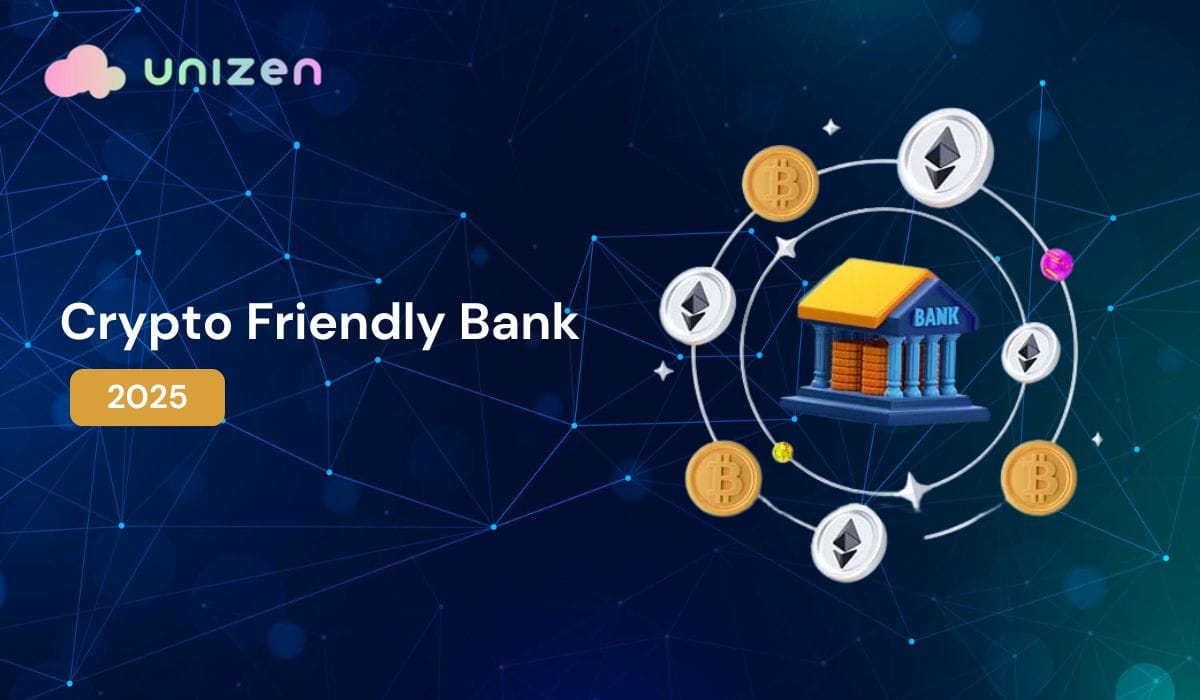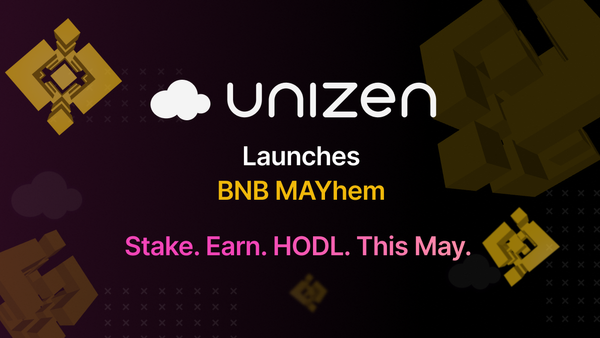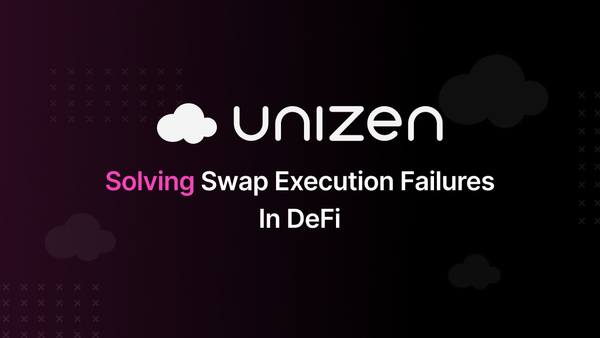What Banks Are Crypto Friendly?
Find out what banks are crypto friendly, the Top crypto-friendly banks in 2025, why individuals and businesses need crypto-friendly banks for transactions.

The world's financial landscape is in a state of transition as people are more open to blockchain and cryptocurrencies. In the past, mainstream banks were not welcoming to digital currencies because of their volatility and the way they were being regulated. However, currently, there has been growing interest in banking with crypto. In case you're wondering what banks are crypto friendly, it's much simpler and there are a lot of crypto banks now.
Many banks now allow direct transactions with cryptocurrency exchanges, making it easier for customers to sell and purchase crypto. You can also transfer digital assets without any restrictions, and some banks even partner with crypto platforms to offer integrated services. These major banks and financial institutions are also looking into blockchain technology to simplify operations, improve security, and enhance transaction speed.
Why Crypto-Friendly Banks Matter
Crypto-friendly banks help to connect traditional finance and the decentralized economy by allowing for seamless crypto transactions and better regulations, making it easier for people to use and adopt cryptocurrencies. Cryptocurrencies generally require a sound financial framework to enable people to use it. Even as crypto wallets and decentralized finance (DeFi) platforms enable substitute financial tools, banks are vital in bringing crypto into regular financial transactions.
Crypto-friendly banks provide banking rails to allow businesses and individuals to easily keep, sell, and buy digital assets, which is lacking when utilizing standard banks. They provide on-ramps and off-ramps for users to fully understand its interface with the crypto world without high fees and lags on the system.
Beyond access, banks offer legitimate crypto transactions. Imposing anti-money laundering (AML) and know-your-customer (KYC) protocols reduces illegal activities, and regulators, businesses, and retail investors can rest assured that they're operating legitimate transactions.
Key Features of Crypto-Friendly Banks
- Seamless Integration with Crypto Exchanges & Direct Account Linking: You can directly link cryptocurrency exchanges with crypto-friendly banks. With this, users can deposit and withdraw funds at low charges and without any delays. This way, you can absolutely enjoy stress-free trading, selling, or purchasing of digital assets and enjoy real-time fiat-to-crypto transactions.
- Instant Transfers: Traditional banks can be slow in handling crypto-based transactions. This is because of the risks involved. However, crypto-friendly banks only operate with instant deposits and withdrawals.
- Lower Transaction Fees: Crypto-friendly banks have low transaction fees for transfers between bank accounts and crypto exchange accounts. Let's be honest; this is way cheaper for regular traders.

Benefits of Crypto-Friendly Banks to Businesses and Individuals/Investors
There are unique benefits to using crypto-friendly banks for both businesses and individual investors. This helps customers experience freedom, security, and efficiency.
To Companies:
- Smooth Crypto Payments: Companies can accept payments in cryptocurrencies and convert them into fiat currencies without involving third-party exchanges.
- Improved Cash Flow Management: Companies that have international buyers get lower transaction charges and faster cross-border payment.
- Crypto Lending and Funding: Banks offer loans backed by cryptocurrency, so companies can borrow funds against their digital holdings without selling their assets.
- Regulatory Compliance Support: The crypto-beneficial banks operate to help companies comply with changing regulatory demands, lowering legal risk requirements.
For Individuals/Investors:
- Storage and Custody: Most financial institutions provide institutional-level custody services to safeguard digital assets from cyber threats and prevent theft.
- Crypto Trading and Staking: As an investor, you can purchase, sell, and stake cryptocurrencies directly through their bank apps, and you do not need to use any extra platforms.
- Crypto-Friendly Bank Integration with Traditional Banking: Clients can quickly transfer between fiat and digital currencies.
- Crypto Spend and Reward: Banks that allow crypto debit and credit cards enable their clients to spend their digital balances while earning rewards.
To manage risks with digital assets effectively, crypto-friendly banks have established proper compliance. They ensure that users follow the AML and KYC compliance to prevent illegal financial activities like money laundering and fraud. They also mitigate customer risk by offering insurance and other security features to protect funds from getting hacked or cyber-attacked. Therefore, by adhering to the compliance protocols, crypto-friendly digital banks could validate digital currencies, which allows governments and traditional institutions to accept cryptocurrency as a legitimate currency in the crypto space.
Bank Integration with Crypto Exchanges
Crypto-friendly banks have direct access to cryptocurrency exchanges. This integration is what ensures users can buy, sell, and exchange digital currencies easily. They can, in fact, make immediate transfers between bank accounts and crypto exchanges, which then allows immediate deposits and withdrawals in and out of the crypto exchanges. They also have lower transaction fees and improved security and are usually covered by bank encryption and fraud protection.
How to Choose a Crypto-Friendly Bank
With the increasing use of cryptocurrencies, choosing the right crypto-friendly bank is important for individuals and businesses that want to manage digital assets efficiently. You need to know what banks are crypto friendly in order to be able to choose correctly. While some banks provide simple crypto support, others can be complicated:
For Individuals
Obviously, you would typically want a stress-free, affordable means to handle your assets. Banks try to meet the requirements by integrating crypto-banking services that create smooth and comfortable transactions. While choosing a crypto bank, compare your deposit, withdrawal, and exchange fees to make sure that you can afford them. Watch out for banks that don't charge for exchanging fiat and cryptocurrency accounts. Some banks have competitive exchange rates for in-app crypto trading.
You also don't need a mobile application or online banking platform that is complicated to trade. Some banks give customers the option of buying, selling, and holding cryptocurrencies with just a few clicks. Check out banks implementing cybersecurity practices, including two-factor authentication (2FA) and biometric login. Make sure that the bank is partnered with secure crypto custodians for asset protection.
For Businesses
Choose a bank that supports business accounts for businesses that accept cryptocurrency payments. Some banks provide APIs for seamless integration with crypto payment processors. This is in total compliance with financial regulations to safeguard businesses against legal risks. Firms seeking finance should confirm whether the bank maintains crypto-backed loans or institutional investment facilities.
What Banks Are Crypto Friendly? Top Crypto-Friendly Banks in 2025
This section fully explains what banks are crypto friendly in 2025 across regions. It highlights their services, advantages, and positioning in the crypto market:
United States
Ally Bank
Ally Bank is an online-only bank that has strong fintech alignment. While it does not enable the trading of cryptocurrencies directly, it enables the facilitation of external crypto trades, which is easy for clients to use to load up on crypto exchanges. It offers high-yield checking and savings accounts that are easily linked with crypto exchanges and enables ACH and wire transfers for crypto payments. Ally bank provides 24/7 online banking, which is helpful for crypto traders working in global markets. It has a high focus on customer privacy and security in online transactions.
JPMorgan Chase
JPMorgan Chase is an influential bank globally. It introduced its coin, JPM Coin, a digital currency used for settlements among institutional clients. It has a blockchain-based financial platform called Onyx, which 100% shows a serious commitment to digital asset infrastructure. JPMorgan Chase bank offers crypto custody services to institutional investors. JPMorgan is more interested in large institutional investors, and they take pride in proving that when a major U.S. bank decides to support crypto services, it can reshape expectations for the entire sector.
Evolve Bank & Trust
Evolve Bank & Trust is a top banking partner for crypto and fintech companies. It provides banking-as-a-service to many cryptocurrency and blockchain companies. It partners with crypto platforms to facilitate fiat-to-crypto transactions, while offering business banking services to crypto-focused businesses. This bank is right for startups as well as businesses that look to integrate crypto-friendly banking systems into their practices.
United Kingdom
Revolut
Revolut is one of Europe's most crypto-friendly banks. It has a wide range of digital asset offerings. Users can buy, sell, and hold over 80 cryptocurrencies natively while using the app. This bank provides staking facilities for certain crypto investments, where customers are more likely to earn interest, and features in-app crypto purchases. You can make crypto payments and send cryptocurrencies instantly to other Revolut customers. This enables the automatic exchange of crypto and fiat money to make spending more convenient. Revolut is a good choice for retail crypto investors who want to do one-stop banking and crypto.
Wirex
Wirex is a fintech company that focuses on bridging the gap between traditional finance and cryptocurrency. It has multi-currency accounts where users can keep their fiat and crypto balances. To spend digital currency directly, Wirex delivers a crypto debit card to customers, and they give cash back rewards in the form of cryptocurrency for every transaction made using its debit card. Wirex is useful for those who want to use cryptocurrency for daily expenditures.
Monzo
Monzo is an online bank that is gradually establishing its crypto-supporting services. They provide fiat deposits and withdrawals for crypto exchanges and feature third-party integrations, which is actually a great option for crypto traders. Monzo is simple to use, and they selectively flag high-risk platforms or activities that are suspicious. Its fintech-oriented strategy makes it a good market contender.
Lloyds Banking Group
Before, Lloyds Banking Group was not concerned with cryptocurrency but has now started to step into digital asset solutions. They are associated with traditional finance, allowing crypto-related debit card transactions as long as customers do them through recognized channels. Although Lloyds is not yet offering full-scale crypto services, it closely monitors industry developments and regulatory updates.
Europe
SEBA Bank
SEBA Bank is based in Switzerland, and is the pioneer of crypto-friendly banking. SEBA offers multiple crypto services, including secure custody, trading, staking, and investment solutions for cryptocurrencies like Bitcoin and Ethereum. It also offers crypto-backed lending, as the bank allows clients to use their digital assets as collateral to secure loans. SEBA is the first regulated bank to have NFT custody services. Users can safely store and manage their NFT assets. SEBA Bank is one of the top European institutions to start the way forward in crypto banking.
LHV Bank
LHV Bank is a crypto-friendly bank located in Estonia. It allows users to buy, sell, and store digital assets directly on the platform. The bank works with cryptocurrencies that are popular, like Bitcoin and Ethereum. Users can trade on a low scale, and LHV Bank is known for its low transaction fee (0.5%). It has a simple crypto tax reporting system, which provides detailed reports of crypto transactions for tax purposes. The crypto transactions, however, are accessible only via their mobile app, and you can sell or buy crypto through Bitstamp, an international crypto exchange.
Bank Frick
Based in Liechtenstein, Bank Frick maximally incorporates crypto services and banking. The bank caters to crypto businesses and investors exclusively and offers the following services: cryptocurrency trading, custody services, and payment processing on the blockchain. Bank Frick is famous for its contemporary financial philosophy, providing institutional-grade crypto asset management and secure banking services for companies engaged in the blockchain industry. Bank Frick is one of the leading European banks in the digital finance revolution, with its strong regulation and compliance.
Asia-Pacific
DBS Bank
DBS Bank is located in Singapore and is the most crypto-friendly among the traditional Asian banks. They offer both institutional and retail crypto exchanges and services. DBS bank has its DBS Digital Exchange (DDEx), where accredited investors and institutions are able to buy and sell cryptocurrencies. They provide custodial services to institutional crypto customers. DBS Bank is ideal for institutional investors looking for a secure and regulated environment to trade cryptocurrencies.
SBI Sumishin Net Bank
SBI Sumishin Net Bank is Japan's top blockchain banking industry, which was formed through a collaboration between SBI Holdings and Sumitomo Mitsui Trust Bank. They partner with blockchain firms to develop distributed ledger technology (DLT)-based financial products. They provide banking services designed exclusively for crypto and blockchain businesses and give crypto lending services, whereby users can borrow money on their digital assets. It is one of the best options and a good choice for crypto enthusiasts.
Global and Cross-Border Crypto Banking Solutions
With the increasing digital finance ecosystem, institutional investors and businesses require efficient cross-border solutions to enable both crypto and traditional banking:
Fiat Republic
The biggest issue in crypto businesses is maintaining stable fiat banking channels. Most banks still consider crypto companies and businesses as high-risk and have histories of account closures and de-banking. Fiat Republic addresses this by acting as an intermediary layer between the crypto companies and the standard banks, adding multiple banking providers into a single platform.
By offering seamless compliance, risk handling, and fiat processing, Fiat Republic expedites the process of starting ventures and cryptocurrency operations without requiring startups and businesses to negotiate with various bank associations. This largely reduces the inconvenience of fiat-to-crypto settlements for companies that operate via the Eurozone, UK, and USA.
BCB Group
BCB Group provides financial services to institutional clients, crypto exchanges, and OTC desks. UK Financial Conduct Authority (FCA)-regulated BCB Group provides essential services like large-volume crypto accounts trading liquidity solutions, multi-currency settlement networks to enable fiat transactions and payment rails for seamless fiat-crypto integration.
One of the developments of BCB Group is its BLINC network, which enables real-time settlement among participants. This particularly benefits firms with 24/7 trading desks, as it enables uninterrupted liquidity and faster cross-border payments. For firms seeking to scale globally, BCB Group's multi-jurisdictional infrastructure provides an effective and compliant infrastructure to enable seamless fund transfer, regulatory filtering, and bank connectivity worldwide.

The Future of Crypto-Friendly Banking
Blockchain technology transforms how banks deal with transactions, customer identity verification, and assets. Banks will adopt more blockchain-based financial products in the future to promote efficiency, security, and transparency. Some of the largest financial institutions have already begun developing blockchain-based payment networks for faster, more secure, and less expensive cross-border transactions. For instance, JPMorgan Chase has introduced JPM Coin, an institutional client payment solution based on blockchain, and DBS Bank operates DBS Digital Exchange (DDEx), an institutional crypto trading platform. All these point out that blockchain is becoming an essential infrastructure for modern banking.
Tokenization is another future trend that will reshape reputable crypto friendly banking. Banks are looking into how to tokenize real-world assets such as stocks, property, and commodities using blockchain technology. Banks might offer tokenized stocks and bonds to facilitate fractional ownership and greater liquidity. Real estate could also be tokenized to enable investors to have fractional ownership of real estate assets without the traditional barriers to entry. Furthermore, governments are now developing blockchain-based versions of their native currencies, CBDCs, that banks will adopt for digital payments.
The Rise of Staking Rewards and Decentralized Finance (DeFi) Integration
Banks have long offered interest on savings accounts, but staking is a more recent model in which users can earn passively. Staking is the process of tying up one's crypto holdings in a blockchain network to contribute to its security and operations, and, in return, users are rewarded. Revolut already supports in-app staking functionality, where users can earn staking rewards for holding certain cryptocurrencies. Binance and Coinbase provide staking with annual percentage yields that consistently beat traditional savings accounts. More banks will integrate staking into their banking products to attract customers who want more yield than traditional bank products.
DeFi Banking
Decentralized Finance (DeFi) is a rapidly developing area that offers financial services such as lending, borrowing, and yield farming without any intermediaries. DeFi platforms are currently outside the traditional banking system, but some banks are considering hybrid models that integrate DeFi functionality into one. Potential DeFi integrations in banks can include crypto-backed loans, where customers can use their crypto holdings as collateral for loans. There can also be yield farming and liquidity pools where banks can provide access to DeFi protocols to generate income. Lastly, banks can adopt decentralized identity verification, which involves using blockchain-based ID verification for simpler customer onboarding.
Conclusion
Banks play a central role in bringing fintech and cryptocurrencies together, providing the infrastructure for wider cryptocurrency adoption. By embracing blockchain technology, compliance structure, and financial innovation solutions, these institutions are shaping the future of banking. As regulations continue to strengthen and the demand for crypto-friendly services grows, the most innovative banks will lead the charge to a secure, inclusive, and efficient financial system for fiat and digital currencies.
Choosing the right crypto friendly bank is vital for entrepreneurs and individuals looking to incorporate digital assets into their financial activities without stress. To fully understand what banks are crypto friendly, know that the ideal bank should offer safe transactions, regulatory assistance, and simple-to-use services, such as crypto trading, staking, payment services, or lending. As the industry continues to grow, selecting a bank that meets your financial needs and future ambitions will offer a smooth and efficient crypto-banking experience to build your crypto portfolio.
Frequently Asked Questions
What is a crypto-friendly bank?
A crypto-friendly bank is a banking institution that caters to transactions based on cryptocurrency. This involves allowing users to buy, sell, and store digital currencies, integrate with the exchanges of digital currencies, and access services.
Why do I need a crypto-friendly bank?
Most traditional banks block or restrict cryptocurrency transactions due to regulatory problems. Meanwhile, crypto-friendly banks offer seamless connectivity with exchanges, lower fees on crypto transactions, and regulatory compliance with legal requirements. Therefore, this helps individuals and companies dealing in digital assets.
Are crypto-friendly banks regulated?
Absolutely, most crypto-friendly banks stick to KYC and AML policies.
Do crypto-friendly banks offer debit or credit cards?
Yes, a few crypto-friendly banks offer crypto debit and credit cards to allow individuals to spend their digital currencies at stores globally. Examples are Wirex, which offers multi-currency accounts with rewards in the form of cryptos, and Revolut, which offers a crypto-linked card for everyday use.
What banks are crypto friendly?
They include: Ally Bank, JPMorgan Chase, Evolve Bank & Trust, Revolut, Wirex, Monzo, Lloyds Banking Group and a few others explained in this article.
Can I send international payments through a crypto bank?
Yes, there are institutions that specialize in cross-border crypto banking services. For example, Fiat Republic facilitates fiat-to-crypto conversion across Europe, the UK, and the US, while BCB Group facilitates liquidity and settlement networks for institutional customers.



